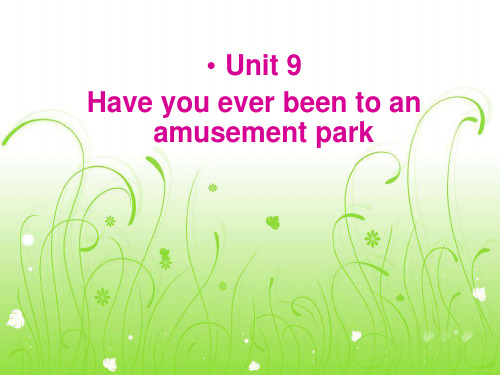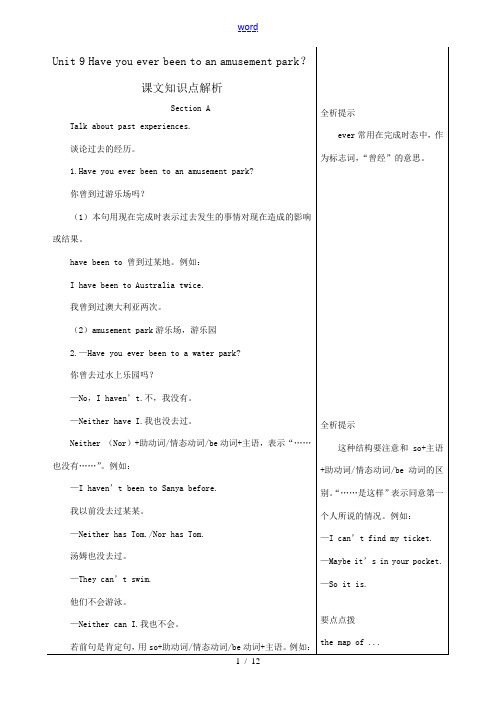2016年人教最新版pep初中初二八年级英语下册Unit9_Have_you_ever_been_to_a_museum_sectionA精品ppt课件
- 格式:ppt
- 大小:2.72 MB
- 文档页数:16


新目标八年级下册Unit 9 Have you ever been to a museum ?讲义一、重点单词1. amusement n. 娱乐; 游戏2. somewhere adv. 在某处; 到某处3. camera n. 照相机; 摄影机; 摄像机4. invention n. 发明物5. invent v. 发明; 创造1. unbelievable adj. 难以置信的; 不真实的2. progress n. 进步; 进展3. rapid adj. 迅速的; 快速的4. unusual adj. 特别的; 不寻常的5. toilet n. 坐便器; 厕所6. encourage v. 鼓励7. social adj. 社会的8. peaceful adj. 和平的; 安宁的9. performance n. 表演; 演出10. perfect adj. 完美的; 完全的11. itself pron.(it的反身代词) 它自己12. collect v. 收集; 采集13. German adj. 德国的; 德语的; 德国人的n. 德语; 德国人14. theme n. 主题15. ride n. 供乘骑的游乐设施; 短途旅程16. province n. 省份17. simply adv. 仅仅; 只; 不过18. fear v. & n. 害怕; 惧怕19. whether conj. 不管......;还是); 或者......(或者); 是否20. Indian adj.印度的 n. 印度人21. Japanese adj.;日本的; 日本人的; 日语的n. 日本人; 日语22. equator n. 赤道23. whenever conj. 在任何......时候; 无论何时24. spring n. 春天25. mostly adv. 主要地; 通常26. location n. 地点; 位置二、短语归纳1.at night在夜晚2.in a more natural environment在一个更加自然的环境中3.all year round 全年4.be far from 离……远5.in the dark 在黑暗中6.in the past 在过去7.have been to sp. 去过某地8.science museum 科学博物馆9.history museum 历史博物馆10.amusement park 游乐园11.go somewhere different 去不同的地方12.go skating 去滑冰13.take the subway 坐地铁14.a great way to spend a Saturday afternoon一个过周六下午的好方法15.all the old movie cameras所有的古老的电影摄影机16.learn about sth.解有关……的情况17.on the weekend 在周末18.camp in the mountains 在大山里露营19.put up a tent搭帐篷20.in such a rapid way 以如此迅猛的方式21.different kinds of各种各样的22.development of toilets 厕所的发展23.social groups 社会团体24.the tea art performances茶艺表演25.make a perfect cup of tea with beautiful tea sets用漂亮的茶具沏一杯完美的茶26.a nice place to enjoy tea 一个品茶的好地方27.thousands of 数以千计的28.International Museum of Toilets国际厕所博物馆29.the Terracotta Army 兵马俑30.Southeast Asia东南亚31.Night Safari 夜间动物园32.three quarters 四分之三33.an English-speaking country一个讲英语的国家34.have problem doing sth. 做某事很困难35.during the daytime在白天36.a couple of times 好几次37.right now 现在;目前38.an amusement park with a special theme一个有特别的主题的游乐园39.walk around the park 在公园里到处走40.hear of 听说41.take a ride兜风42.another province另一个省43.the Bird’s Nest鸟巢44.encourage sb. to do sth.鼓励某人做某事45.on the one hand... on the other hand.一方面,另一方面三、句型集萃1.a great way to do sth一个做某事的好办法2.It’s unbelievable that很难相信……3.watch sb do sth.看某人做了某事4.encourage sb to do sth鼓励某人做某事5.as..as和。


Unit 9 Have you ever been to a museum?单元检测题第Ⅰ卷听力部分(共20小题,每小题1分,满分20分)第一节、听句子,根据所提问题选择与之相符的图片回答问题。
每个句子听一遍。
()1. Where has the man been?()2. When would they like to go camping?()3. Where did they go yesterday?()4. How can they go to the train station?()5. What does Mr. Li often take us to do?第二节、听下面五段对话,根据每段对话内容及问题选择正确答案。
每段对话读两遍。
听第一段对话,回答第6小题()6. How long is the history of China?A. Over 5,000 years.B. About 5,000 years.C. Less than 4,000 years.听第二段对话,回答第7小题()7. Where is Mr. Green?A. In the library.B. At home.C. In the office.听第三段对话,回答第8小题()8. When did Mr. Smith move to New York?A. In 2005.B. Six years ago.C. In 2000.听第四段对话,回答第9小题()9. Which mount did the man visit?A. Mount Hua.B. Mount Tai.C. Mount Heng.听第五段对话,回答第10小题()10. Whose backpack is it?A. Nancy’s.B. Sally’s.C. Cindy’s.听第六段对话,回答第11和12小题。
每段对话读两遍。
( )11. Where did Dad put the meat?A. On the tableB. On the chairC. In the fridge(冰箱)( )12. Why do they need some more meat?A. Because dad forgot to bring the meat home.B. Because mum ate it for lunch.C. Because grandfather and grandmother are coming.听第七段对话,回答第13至15小题。


Unit9 知识点和练习附详细参考答案1. invent(1)invent 作动词,意为“发明;创造”。
例如:Edison invented the light bulb. 爱迪生发明了电灯。
(2)invent还可以表示“虚构”。
例如:The whole story was invented. 整个故事是虚构的。
(3)invent的名词形式有两个,一个是inventor(发明者;发明家),另一个是invention (发明物)。
例如:Edison is a great inventor in history.爱迪生是历史上伟大的发明家。
Human history is also a history of great inventions.人类的历史也是一个伟大发明的历史。
【拓展】invent和discover的辨析:(1)invent 意为“发明,发明之物”指“从无到有”。
例如:Alexander Graham Bell invented the telephone in 1876.亚历山大•格雷厄姆•贝尔在1876年发明了电话。
(2)discover 意为“发现”,指“本来就已经存在,但不为人知”的事物。
例如:Columbus discovered America in 1492. 哥伦布在1492年发现了美洲。
2. unbelievableunbelievable作形容词,意为“难以置信的;不真实的”,是由believable“可相信的;可信任的”加否定前缀un-派生而来的。
其动词形式为believe,意为“相信;以为”。
例如:It's unbelievable that you are a writer. 我难相信你是一个作家。
【拓展】un-是个前缀,意为“不”。
例如:happy“高兴的”— unhappy“不高兴的”;lucky“幸运的”— unlucky“不幸的”;important“重要的”— unimportant;“不重要的”;healthy“健康的”— unhealthy“不健康的”。
Unit 9 Have You Ever Been to an Amusement Park?一、学习目标:1.掌握现在完成时的用法;2.了解一般过去时、现在完成时和现在完成进行时的意义的区别;3.能够准确使用多种时态谈论自己的经历。
二、学习重点难点:1. 现在完成时由主语+have/has+过去分词构成。
其主要用法如下:I.在未指明具体时间的情况下,现在完成时动词通常可以表示在说话之前已经完成,而后果或影响至今仍存在的动作。
例如:The concert has started. 音乐会已经开始。
I have had breakfast. 我已吃过早饭。
注意:have gone to 和have been to 在意义上有区别。
例如:He has gone to Hong Kong. 他到某某去了。
(他已前往某某,或在途中,或已到达。
说话人暗示他现在不在现场。
)He has been to Hong Kong. 他曾到过某某。
(说话人认为他过去到过某某,现在已不在该地。
言外之意他对某某有所了解。
)II. 现在完成时动词可以表示开始于过去持续到现在(也许还会继续进行下去)的动作或状态。
例如:1) I have studied English since last year. 我从去年开始学习英语。
2) She has lived in Beijing for five years. 她住在已经五年了。
注意:e, go , leave, arrive, buy, lose, receive, join, die, bury 和marry 等动词所表示的动作是一时的,不能延续的,故不能与for …,since …等开头的表示一段时间的状语连用。
不过,这些词用于否定句则可以与表示持续的时间状语连用,即动作的不发生是可以持续的。
例如:不能说:*He has e to Beijing for two years.*He has bought that book for three weeks.*He has joined the Army for one and a half years.*His grandma has died for nine months.* I have received his letter for a month.可以说:He has been in Beijing for two years.He has had that book for three weeks.He has been in the army for one and a half years.His grandma has been dead for nine months.I haven't received his letter for almost a month.或者:It is two years since he came to Beijing.It is three weeks since he bought that book.It is one and a half years since he joined the Army.It is nine months since his grandma died.2. 现在完成时把过去的动作和现在的结果联系起来,一般过去时只限于表示过去的动作本身,与现在的结果无关。
任集中心学校人教新目标八年级英语(下)编制:任印丽审核:审批:评价:Unit9 .Have you ever been to a museum?第四课时Section B (2a—2e)【学导目标】:1. To read and understand the passage about Singapore2. To read for specific information3. To learn to make notes after reading4.To learn new words: thousand,thousands of , safe, simply, fear, whether, Indian, Japanese, fox, whenever, spring, mostly.all year round,equator ,location【自学质疑】:1自主导航:1)英汉互译在东南亚__________ 觉得勇敢__________ 似乎很奇怪______________西餐__________ 在白天_______________ 醒来______________四分之三_____________ 尝试新食物_______________度假胜地_____________________ 天黑——————一个普通的动物园______________ 几乎相同____________________练习英语的好地方__________________ 一年到头_____________________2).重要句型1. ________ you like ________food, Western food or _________ food, you’ll find it all in Singapore!不管你喜欢印度食品,西方食品,还是日本食品,你都能在新加坡找到她.2.This is the best time ____ (watch ) them.2研读质疑:Task1:Read Para. 1 and choose the best anwers1.Singapore is in ___Asia.A .South B.East C.Southeast D.Northeast2.-Do you know a good place ___a holiday?A.takeB.takingC.to takeD.takenTask2:Read Para. 2 and answer the questions1)Can we find any Chinese food there?2)What kind of Chinese food can we eat in Singapore?____________________3)Can we try any kind of new food there?____________________________Task3:Read Para. 3 and fill in the blanks.1.Singapore has a special zoo called ____________________.2.A lot of animals ____________at night, so this is _______________ to watch them3.The temperature in Singapore is almost the same ______(全年)Task4:Read Para. 4 and answer the questions below.1. Why is the temperature in Singapore almost the same all year round?(不多于十个字)2. When can we go to Singapore?(不超过5个字)【测评提升】一)基础测评1.单项选择1. — Have you _____read the poem If ?— Yes. I really enjoy it.A. stillB. everC. yetD. been2. — ____you ever ____West Lake before?— Yes. I went there last summer.A. Have; been toB. Have; gone toC. Have; been in3. — Have you ever been to Hangzhou, Lucy?—No, I haven’t. What about you?— ______.A. So do IB. Me neitherC. Me, tooD. So have I4. — I prefer to eat cakes that have cream on top.— ____! They are delicious.A. Good luckB. Me, tooC. I hope soD. You’re kidding5. ______ of the students in our class _____ money for the disabled people these days.A. Two third; have raisedB. Two thirds; has raisedC. Two three; have raisedD. Two thirds; have raised6. — What about these two sweaters,madam?— _____of them fits me. Could you show me another one?A. BothB. EitherC. NoneD. Neither7. — Where is Zhang Ming?—Oh, don’t y ou know he _____ to Beijing to see his parents andhe’ll be back tomorrow?A. has goneB. has beenC. had gone8. — ____ you ever ____ Shanghai for 2010 World Expo?— Not yet. I will visit it this summer vacation.A. Had; gone toB. Have; gone toC. Had; been toD. Have; been to9. —Where is John?—He ____ to the library and he _____ there for an hour.A. has been; has beenB. has gone; has beenC. goes; wentD. has been; will be二)用所给词的适当形式填空1. He ____ ever ______ (be) to the History Museum several times.2. -- _____ you ever _____ (be) to the zoo?-- Yes. I _____ (go) there last summer. I ____ (see) many kinds of animals there.3. – May I speak to Ann?-- Sorry, she isn’t in. He ________ (go) to Fran ce.4. Three __________(quarter) of tourists came from China.5. Did you buy a ________ (Japan) car last week。
Unit 9 Have you ever been to a museum?Section A(1a-2d)知识点一have/has been to去过某地Have you ever been to a science museum?你曾经去过自然博物馆吗?have/has been to意为“曾经去过某地”,但现在已不在那里了。
I have never been to Kunming before.我以前从没去过昆明。
My father has been to Hong Kong many times.我爸爸去过香港很多次。
1.have/has gone to意为“去了某地”,说话时该人不在现场,主语为第三人称。
—May I speak to Mr.Smith?——我可以和史密斯先生通电话吗?—Sorry,he has gone to China.——抱歉,他去英国了。
2.have been in意为“在某地”,表示在某地待了多少时间,常与表示一段时间的状语连用。
They have been in New York for five weeks.他们在纽约五周了。
知识点二反意疑问句It’s really interesting,isn’t it?它真的很有趣,不是吗?这是一个反意疑问句。
反意疑问句是由“陈述句 +附加疑问句”构成,遵循“前肯后否,前否后肯”原则。
此问句可用yes或no来回答。
附加反意疑问部分的主语要用代词,并与陈述部分主语一致,谓语动词在人称、数和时态上也要与陈述部分一致。
Linda won the speaking competition,didn’t she?琳达赢了演讲比赛,是吗?【温馨提示】1.含有never,hardly,seldom等的句子为否定句,反问部分用肯定形式。
2.反义疑问句的回答要“据实回答”,即事实是肯定的,就做肯定回答;事实是否定的,就做否定回答。
—Mary comes from England,doesn’t she?——玛丽来自英国,是吗?—No,she doesn’t.She is from the UAS.——不,不是。